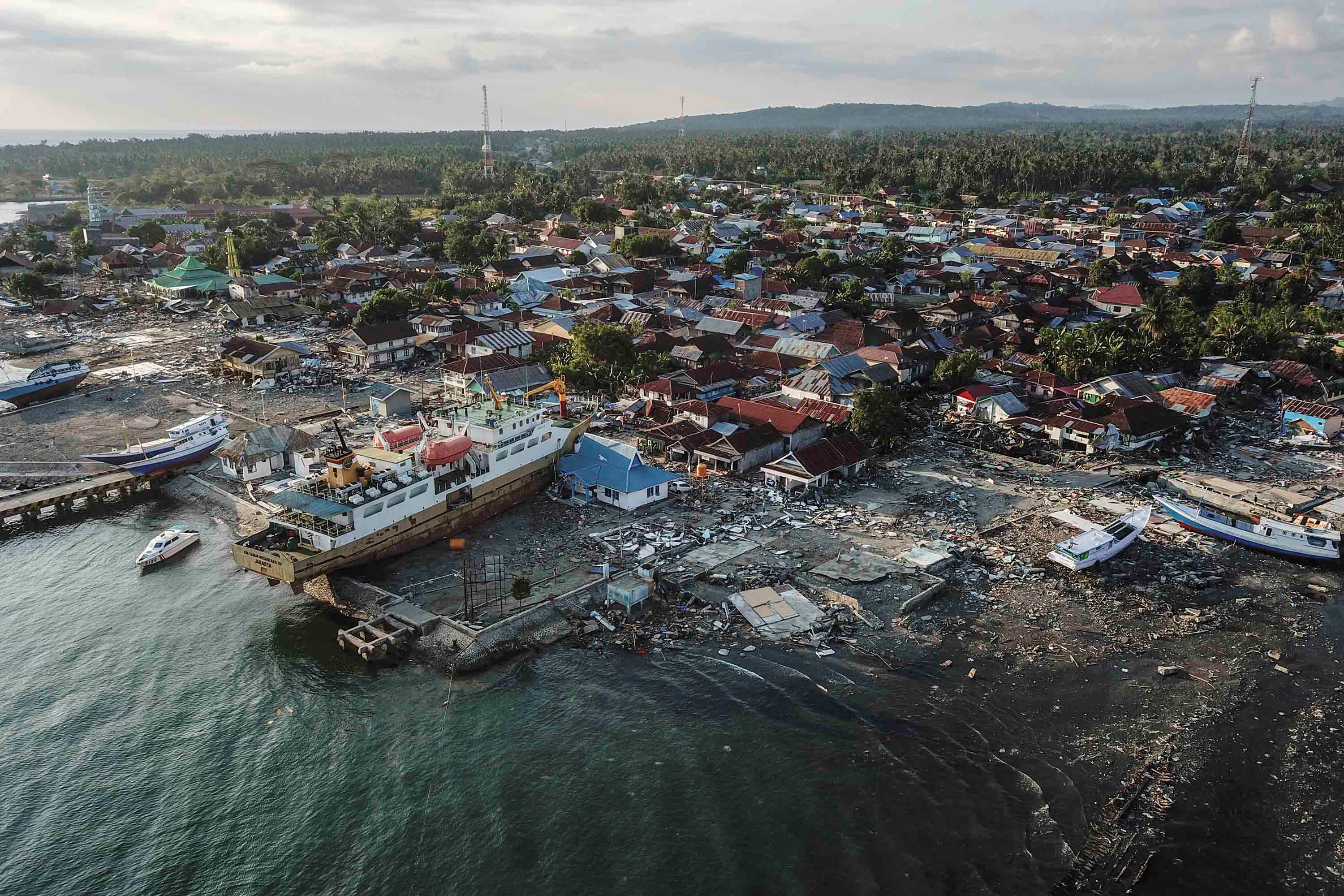I have been so focused on the Brett Kavanaugh hearings that I’ve been overlooking some of the horrific events occurring elsewhere, such as the tsunami that decimated Indonesia (so far, 1234 deaths recorded) or, closer to home and having a human cause, the uprooting of hundreds of immigrant children, still separated from their parents, from one location to another under cover of night. I write about the first today and will write about the second tomorrow.
Actually, for today’s post I reprint one I wrote seven years ago following the even worse tsunami that devastated Japan in 2011 (15,896 deaths, 6,157 injured, and 2,537 people missing, according to Wikipedia). The question I asked then is what is the use of poetry at such moments given the inadequacy of words.
Reprinted from March 21, 2011
As I wrote last year when the earthquake hit Haiti, all human language, even literature, comes up short when faced with disaster and death. Literature is language by humans about humans, and destruction on this scale seems to laugh narrative and image to scorn.
Nevertheless, being human, we try to bring even apocalyptic disasters into a narrative that we can comprehend. It’s why Genesis has the story of Noah, the narrative of an angry God punishing a sinful people. It’s not a happy story but at least the unexplainable is brought into the human sphere. Today there are Christians who find the Japanese tsunami in the Book of Revelations and Muslims who say it was foretold in the Koran. Such religious stories offer the consolation that horrific events serve some larger purpose, even though we may not know what that purpose is.
Of course some, claiming to know the inscrutable mind of God, are all too willing to tell us what “He” has in mind. I’m thinking, for instance, of evangelist Pat Robertson claiming that the Haitian earthquake was caused by a 19th century deal with the devil to kick the French out.
As ridiculous and offensive as Robertson is, all of us do a version of his explaining. Our minds probe away at the disaster, trying to find some human fallibility that accounts for it. After all, if humans helped cause it, then we might be able to prevent future disasters. We just have to do something different. An explanation, almost any explanation, gives us the illusion that we are not powerless. Probing into the cosmic meaning of an event is the premise for Thornton Wilder’s fine novel The Bridge over San Luis Rey.
The Japanese tsunami challenges us because nothing about it can be attributed to humans. This is not a narrative of abused nature rising up in wrath at what humankind has done to the earth. This is not the Dionysus of Euripides’s The Bacchae striking back at an arrogant Pentheus. Prehistoric villages would have been destroyed no less than the Japanese city of Sendai, even though they left a far lighter footprint on the earth.
True, there would have been fewer inhabitants and they would not have had nuclear reactors. But fewer deaths would have made it no less tragic for those who died.
In his poem “Hap,” Thomas Hardy puts forth the terrifying possibility that our suffering is meaningless. In fact, he says that he would prefer that there were some malevolent god above us who was dishing out misery than no god at all. The suffering caused by such a god would at least fit within some framework. After all, we understand human malevolence.
But, Hardy asks, what if “joy slain” and hope cut off are nothing more than blind chance. What if “crass Casualty” and “dicing Time,” two “purblind [dim-witted] Doomsters,” are the sole reason for the cataclysm. Then suffering has no meaning and, by the same reasoning, neither does our happiness.
Here’s the poem:
Hap
If but some vengeful god would call to me
From up the sky, and laugh:
“Thou suffering thing,
Know that thy sorrow is my ecstasy,
That thy love’s loss is my hate’s profiting!”
Then would I bear it, clench myself, and die,
Steeled by the sense of ire unmerited;
Half-eased in that a Powerfuller than I
Had willed and meted me the tears I shed.
But not so. How arrives it joy lies slain,
And why unblooms the best hope ever sown?
Crass Casualty obstructs the sun and rain,
And dicing Time for gladness casts a moan. . . .
These purblind Doomsters had as readily strown
Blisses about my pilgrimage as pain.
Hardy’s vision is as stark as it gets.
Yet paradoxically, just by writing a poem that voices our despair, Hardy gives us hope. Language, inadequate though it may be, still rises up to register a protest. We are still fighting to use the tools we have to grapple with the unknown.
And perhaps struggling is healthier than calmly reassuring ourselves that there is a higher reason for these deaths. “God’s higher plan” can become an abstraction allowing us to look past flesh-and-bones suffering.
When others are suffering, it is not the time to be focusing on finding consolations for ourselves. Think instead of the victims and their families and friends.
In that fellow sympathy, I believe, we will find a higher meaning. In our love for humanity, we give our lives purpose. I believe that this was Jesus’s message, but one doesn’t need to ascribe a particular religious framework to it. Do our hearts break at the images coming out of Japan? Yes, and they should break. Now, can we take our sympathy and apply it to those close around us who are also suffering?
